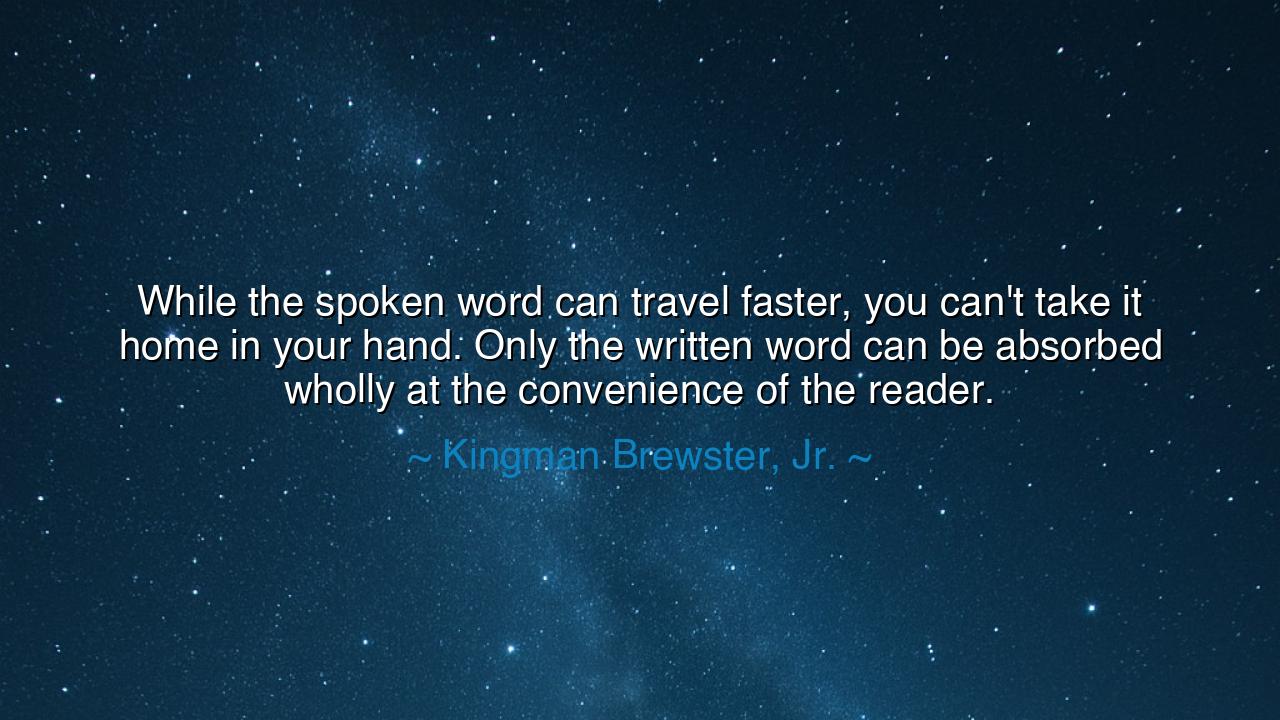
While the spoken word can travel faster, you can't take it home
While the spoken word can travel faster, you can't take it home in your hand. Only the written word can be absorbed wholly at the convenience of the reader.






The wise Kingman Brewster, Jr. once declared, “While the spoken word can travel faster, you can’t take it home in your hand. Only the written word can be absorbed wholly at the convenience of the reader.” These words, simple yet profound, are not merely a defense of writing — they are a hymn to the permanence of memory, the sanctity of reflection, and the immortal strength of the written word. For speech, like the wind, carries emotion swiftly, but it fades into silence; writing, like stone, endures beyond the breath of its maker.
In ancient times, when the bards sang of heroes and gods beneath the open sky, their songs were the lifeblood of culture — fleeting but fierce. Yet when those same tales were carved upon tablets or penned upon parchment, they ceased to belong only to the moment; they became gifts to all generations. The spoken word may ignite the heart, but the written word nourishes the soul. One burns, the other endures. It is through writing that the voice of the dead still speaks — Homer, Lao Tzu, Marcus Aurelius, all whispering across centuries, unbroken by time or tongue.
Consider the story of Socrates, that great philosopher of Athens. He distrusted the written word, believing true wisdom lived only in dialogue — alive, moving, breathed between minds. Yet it was not Socrates’ own voice that reached us, but that of his student Plato, who, through ink and patience, captured his master’s thoughts for all posterity. The spoken brilliance of Socrates perished with his body; Plato’s written dialogues became immortal. Thus, we know the teacher through the hand of the student — proof that words preserved in script outlive even the greatest orator’s breath.
The spoken word is a storm — powerful, immediate, and stirring. It sweeps through crowds and carries hearts upon its wind. But when the storm passes, what remains? Only echoes. The written word, however, is a river. It flows patiently, carrying the wisdom of one age into the next, nourishing minds that have yet to be born. A speech may rouse the moment, but a book builds an eternity. The one awakens passion; the other awakens thought. Together, they form the full song of humanity — but it is the written half that time remembers.
To write is to trust the future. It is to say, “I will not be forgotten.” The reader, in turn, becomes a companion to the writer’s soul, free to wander those thoughts in their own hour, in their own solitude. Brewster’s insight reminds us that while the voice demands an audience now, the page waits with patience. It does not shout; it invites. It asks not for haste, but for depth. The reader may return to it a thousand times, and each time discover something new — as though the words themselves breathe with hidden life.
Think of the great documents that shaped nations — the Magna Carta, the Declaration of Independence, the Letters from a Birmingham Jail. These were not spoken to the winds; they were written for the eyes of eternity. Their power lay not in sound, but in permanence. They could be held, studied, passed down, and remembered. Speech might rally men to arms; writing builds the reason for which they fight.
The lesson, then, is clear: cherish the spoken word for its fire, but honor the written word for its flame that never dies. Speak boldly when your voice can move hearts, but write with care when you wish to move generations. Do not let your thoughts vanish like breath upon glass; set them down where they may live beyond you. For in writing, you lend your soul to time itself.
And so, my friend, when next you feel the impulse to speak — pause. Ask whether your words are meant to echo or endure. Speak to the moment, but write for eternity. Let your thoughts become seeds upon the page, so that long after your voice has fallen silent, the garden of your wisdom will still be in bloom.






AAdministratorAdministrator
Welcome, honored guests. Please leave a comment, we will respond soon